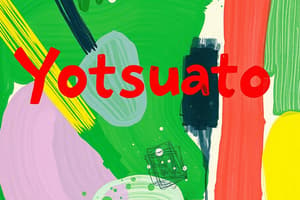Podcast
Questions and Answers
What does 'どういたしまして' mean?
What does 'どういたしまして' mean?
- Thank you
- Nice to meet you
- Good night
- You're welcome (correct)
What does 'どうぞよろしく' mean?
What does 'どうぞよろしく' mean?
- You're welcome
- Nice to meet you (correct)
- Likewise
- Seven people
What is the meaning of '両親'?
What is the meaning of '両親'?
both parents
What does '親' stand for?
What does '親' stand for?
What does 'どうぞ' mean?
What does 'どうぞ' mean?
What is the meaning of '彼女'?
What is the meaning of '彼女'?
What does '貴方' mean?
What does '貴方' mean?
What does '初めまして' mean?
What does '初めまして' mean?
What is the meaning of 'どうも'?
What is the meaning of 'どうも'?
What does 'こちらこそ' mean?
What does 'こちらこそ' mean?
What does '父' mean?
What does '父' mean?
What is the meaning of '彼'?
What is the meaning of '彼'?
What does '家族' mean?
What does '家族' mean?
What does '七人' mean?
What does '七人' mean?
What does '母' mean?
What does '母' mean?
What is the meaning of '姉'?
What is the meaning of '姉'?
What does '兄' mean?
What does '兄' mean?
What does 'お休みなさい' mean?
What does 'お休みなさい' mean?
What is the meaning of '弟'?
What is the meaning of '弟'?
Flashcards are hidden until you start studying
Study Notes
Japanese Vocabulary Flashcards
- どういたしまして translates to "You're welcome," a polite response to gratitude.
- どうぞよろしく means "Nice to meet you," used during introductions.
- 両親 refers to "both parents," indicating inclusion of both mother and father.
- 親 simply means "parent" or "parents," a broader term for caregivers.
- どうぞ can mean "go ahead" or "here you are," often used to encourage or offer something.
- 彼女 (かのじょ) translates to "she" or "girlfriend," indicating a female companion or partner.
- 貴方 (あなた) directly translates to "you," used to address someone respectfully.
- 初めまして is another way to say "Nice to meet you," typically used on first encounters.
- どうも means "thank you," a casual expression of gratitude.
- こちらこそ translates to "Likewise," used in reciprocation during conversations.
- 父 translates to "father," identifying the male parent.
- 彼 (かれ) means "he" or "boyfriend," referring to a male companion or partner.
- 家族 translates to "family," encompassing all relatives.
- 七人 means "seven people," specifically counting individuals.
- 母 translates to "mother," identifying the female parent.
- 姉 translates to "older sister," indicating a female sibling of higher age.
- 兄 translates to "older brother," indicating a male sibling of higher age.
- お休みなさい means "Good night," used as a farewell before sleep.
- 弟 translates to "younger brother," indicating a male sibling of lower age.
Studying That Suits You
Use AI to generate personalized quizzes and flashcards to suit your learning preferences.




